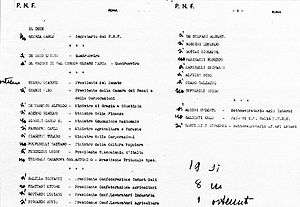Dino Alfieri
Edoardo Alfieri (first name usually shortened to Dino; 8 December 1886 – 12 December 1966) was an Italian fascist politician and diplomat.
Biography

Alfieri was born in Bologna. In 1911 he finished law studies and soon after joined the nationalist group formed by Enrico Corradini. A volunteer in World War I, he was critical of the merger between Corradini's group and Benito Mussolini's Partito Nazionale Fascista (PNF). Nonetheless, he was elected to the Italian Chamber of Deputies on the PNF list in 1924.
Under Mussolini's government, Alfieri was assigned several tasks: between 1929 and 1934, he was co-director of the Exhibition of the Fascist Revolution, deputy secretary of the Corporazioni, and deputy secretary for Press and Propaganda from 1935, assuming the duties of Minister Galeazzo Ciano during the latter's mission in the Second Italo-Abyssinian War. When Ciano moved on to become Minister of Foreign Affairs, Dino Alfieri found himself appointed Minister of People's Culture in 1937, and declared himself to the Antisemitical racial segregation laws passed in 1938.
He was Italy's envoy to the Holy See starting 7 November 1939, and five months later to Nazi Germany (where he often met Adolf Hitler). While there, he was constantly helping out Italian workers and consulate staff. As the war progressed and Italy needed help, he attempted to solicit material aid from Germany but despite assurances little came of it. When the war began to deteriorate for the Axis, he wrote communiques and expressed verbally to Mussolini that the Germans simply saw Italy as a buffer state from the encroaching allies and urged the Duce to seek peace with the allies while simultaneously assuring the Germans that Italy was not betraying them. He was urgently called to Rome in 1943 by members of the Grand Council in order to participate in a meeting. It is unclear as to whether he truly realized what was being proposed at the meeting. A member of the Grand Council of Fascism, he supposedly supported Dino Grandi's coup d'état in July 1943, that led to the fall from power of the Italian Fascist government after 21 years and the arrest of Mussolini. When the Wehrmacht occupied Italy (see Operation Achse), Alfieri fled to Switzerland to save his life.
In January 1944, he was sentenced to death in absentia by a kangaroo court during the Verona trial. The Swiss government did not give him political asylum, but tolerated his attendance in Switzerland.
On 12 November 1946, an Italian court stated his innocence; on 6 February 1947, an inquiry of the Italian Foreign Ministry ended. Then, he was officially pensioned off.
In 1947, he returned to Italy and a year later published his memoirs as Due dittatori di fronte ("[Two] Dictators Face to Face" – i.e.: Mussolini and Hitler).[1] Much details about the hierarchy and events of the war, not well known, are in the book.
External links
- Lettere Inedite Di Vittorio Alfieri Alla Madre, a Mario Bianchi, E a Teresa Mocenni (online at Archive.org)
- Newspaper clippings about Dino Alfieri in the 20th Century Press Archives of the ZBW
Bibliography
- Christian Zentner, Friedemann Bedürftig (1991). The Encyclopedia of the Third Reich. Macmillan, New York. ISBN 0-02-897502-2
- Dino Alfieri, (1967) Dos Dictadores Frente a Frente. Barcelona: Plaza & Janes.
References
- Rizzoli, Milan 1948
